Minnesota Drug Crimes: Everything You Should Know
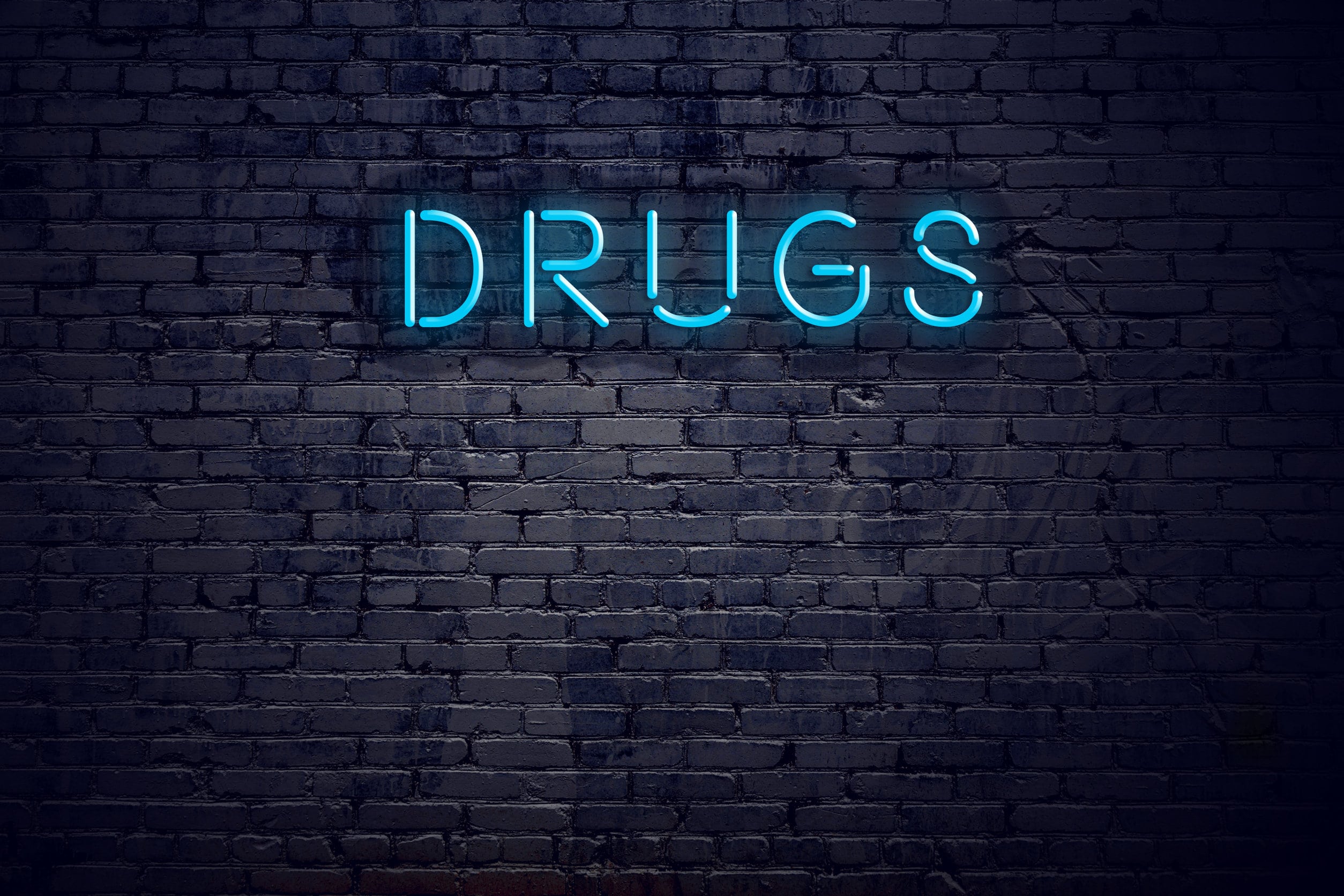
Andrew & Poole, P.A.
Like many other states, Minnesota has strict laws regarding controlled substances. Those who violate these laws can face serious, life-altering penalties.
It’s important for every citizen of Minnesota to understand drug laws and the crimes that can stem from them when violated – as well as the penalties for those crimes. Remember, a conviction for a drug crime can follow you around for life, presenting challenges well after your release from prison. Know the laws and what actions violate them. This the first step to stay on the path that keeps you safe from prison, which could change your life forever.
Here is a comprehensive guide to Minnesota drug crimes.
How Bad Is the Drug Problem in Minnesota?
Our state probably isn’t the first that most people think of when they imagine places with a drug problem, but locals know differently. While the Northland doesn’t quite reach the level of the Minneapolis-St. Paul-Bloomington metro area, illicit drug usage in Minnesota in general is close to the national average, and marijuana usage exceeds it.
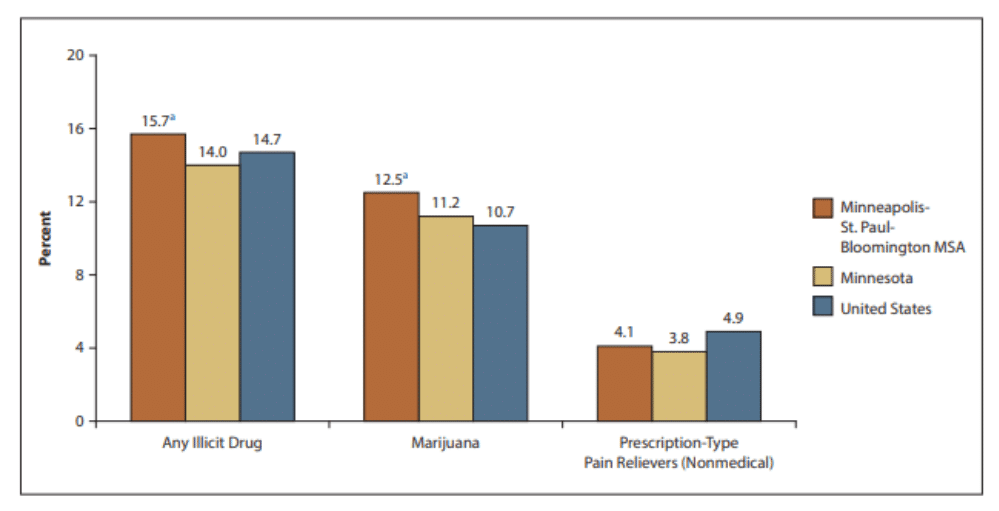
Source: SAMHSA, Center for Behavioral Health Statistics and Quality, National Survey on Drug Use and Health, 2005 and 2006 to 2010 (Revised March 2012).
That isn’t the real issue, though. Our state has a serious and growing problem with opioids – in particular, overdose deaths related to opioid use.
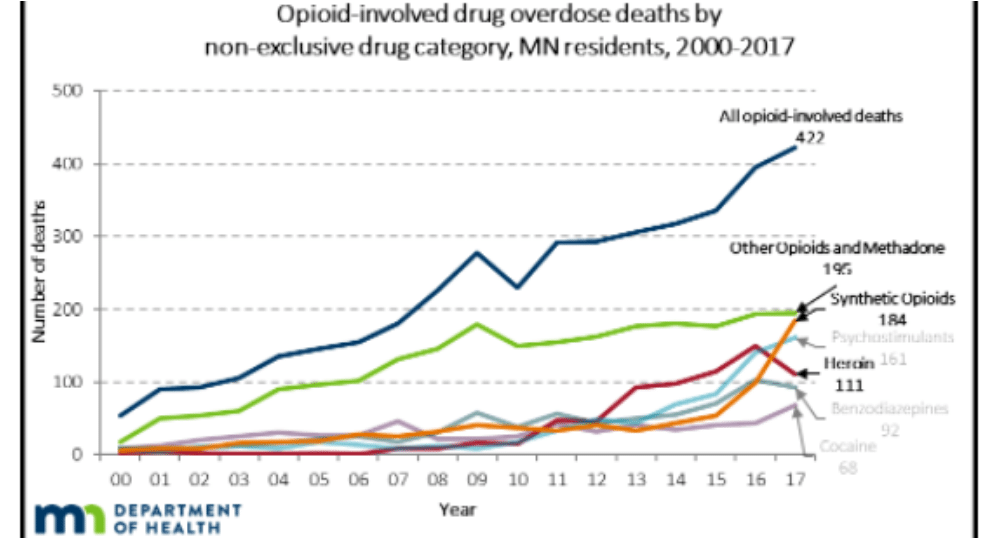
Source: Minnesota Department of Health.
For these reasons and others, Minnesota law enforcement takes illegal drug activity very seriously.
Drug Schedules in Minnesota
As drug crimes in Minnesota are outlined, you’ll notice the reference to schedules in regard to controlled substances. In the state, drugs are divided into five separate schedules.
Schedule I contains the most dangerous drugs that don’t have any designated medical use and carry a high probability of addiction and abuse. Schedule II, then II, then IV, and finally V decrease in the likelihood of addiction and abuse – as well as dangerousness – and they are drugs with some recognized medical use.
Drug Crimes in Minnesota
The state of Minnesota has five different levels of drug crimes. Fifth-degree crimes are considered the least serious while first-degree drug crimes are considered the most serious. Almost every drug crime is a felony with the exception of some subsets of crimes under the umbrella of fifth-degree drug crimes.
Here is a breakdown of the different degrees of drug crimes in the state:
Minnesota First-Degree Drug Crimes
There are certain crimes that fall under the umbrella of first-degree crimes in Minnesota, including:
First-Degree Drug Possession
This occurs when you have drugs on your person or store drugs in a location, like in your bedroom. To be charged with this degree, you must possess certain amounts of different drugs, such as:
- 25 grams of heroin
- 500 grams of hallucinogens, phencyclidine, or amphetamine
- 50 grams of cocaine or methamphetamine – however, possessing only 25 grams of these substances in conjunction with a gun can lead to a first-degree charge
- 500 grams of narcotics, such as codeine or morphine
- 50 kilograms of marijuana
- 500 marijuana plants
Drug Sales in the First Degree
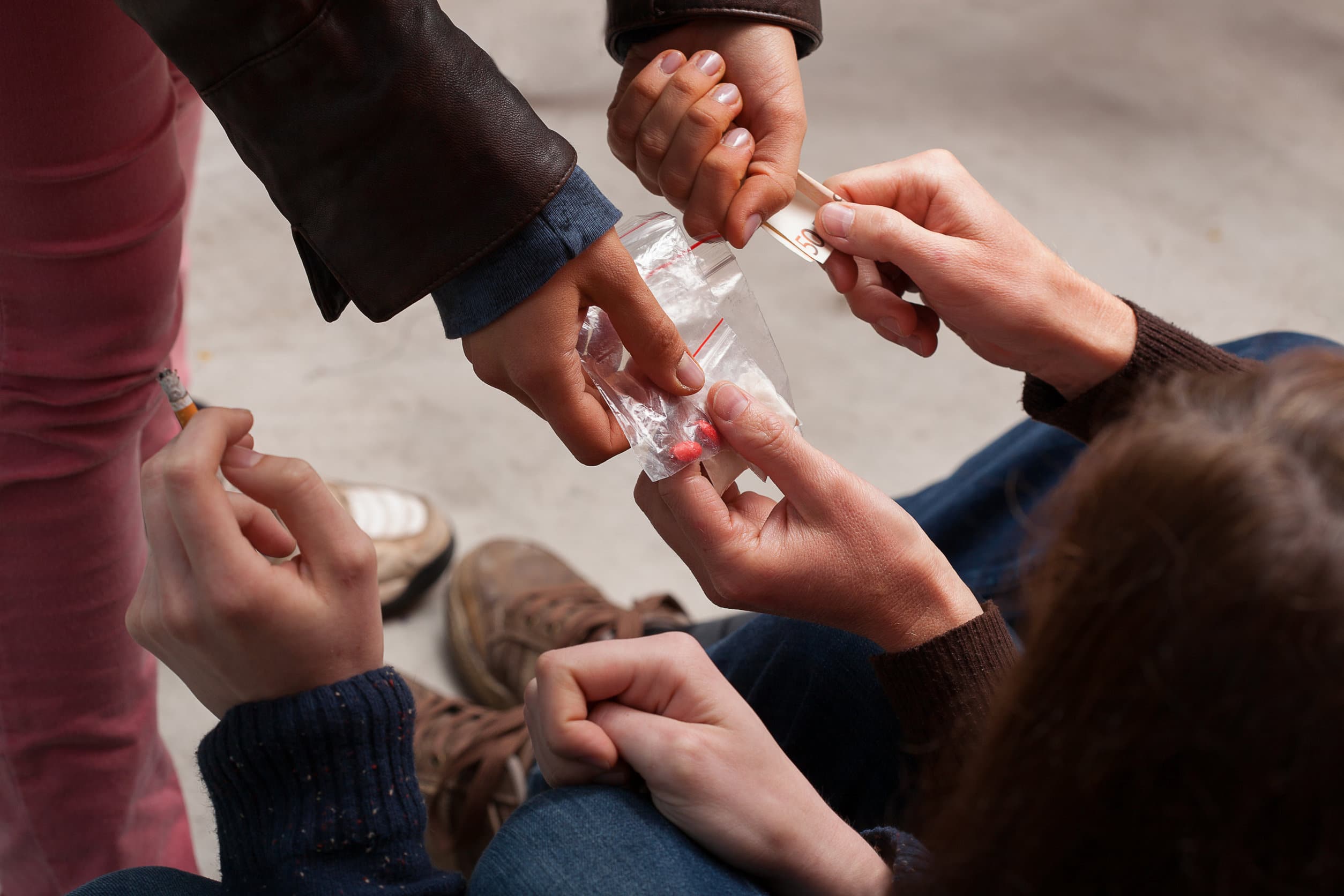
Selling drugs in Minnesota legally goes beyond simply exchanging drugs for money. You can also be charged with this offense if you barter, agree to sell, or offer drugs. Possessing drugs with intent to sell falls under this law – as well as simply giving drugs away.
The types of situations that can lead to a first-degree drug sale charge in the state include:
- Selling at least 17 grams of cocaine or methamphetamines, or 10 grams if you possess a gun
- Selling at least 50 grams of narcotics such as heroin
- Selling 25 kilograms of marijuana
The Penalties for First-Degree Drug Crimes
You can spend up to 30 years in prison for a conviction of a first-degree drug crime in the state. If you have a history of drug crime convictions, then that number can go up to 40 years. You may also face fines of up to $1 million.
For anyone with a history of drug convictions, mandatory minimum sentencing of four years applies to first-degree drug crimes.
Aggravating Factors for First-Degree Drug Crimes
Some first-degree drug offenses are aggravated. Usually, these crimes involve large quantities of drugs as well as the possession of a firearm during the commission of the crime. The factors considered aggravating in Minnesota include:
- Selling drugs to a person under the age of 18
- Dealing drugs to an adult who is vulnerable
- Possessing or selling drugs as an aid to gang activity
- Being at the top of a drug-dealing hierarchy
- Having a violent conviction on your criminal record in the last 10 years
- Possessing supplies that indicate you have a large drug-selling operation, such as a warehouse to package large quantities
Second-Degree Drug Crimes
Second-degree drug crimes are still serious felonies in Minnesota. Usually, they are the same crimes that occur in first-degree situations but simply include fewer drugs.
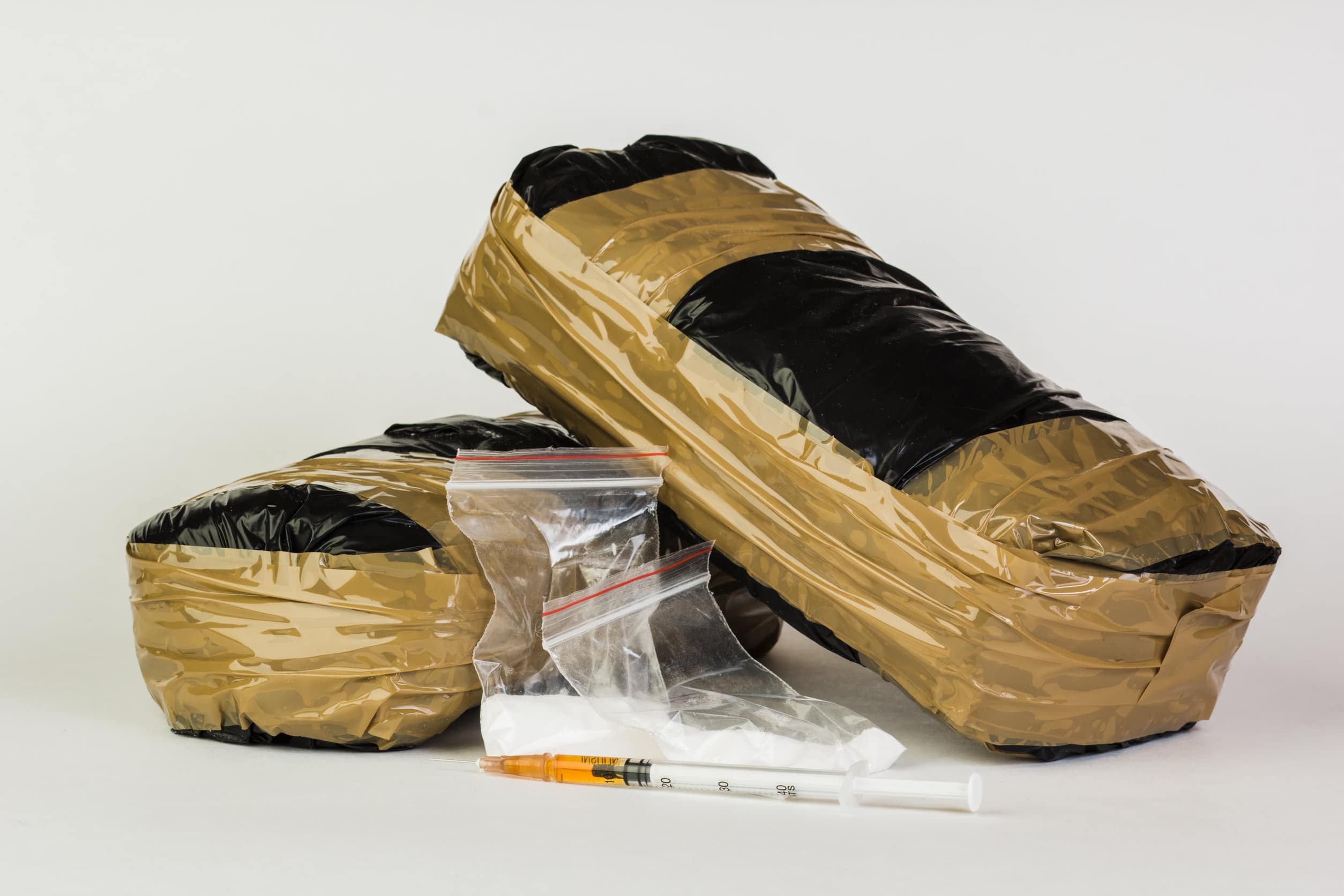
Second-Degree Drug Possession
You are guilty of committing drug possession in the second degree in Minnesota if you:
- Possess a minimum of 25 grams of cocaine or methamphetamines, or a minimum of 10 grams and have a gun in your possession
- Possess a minimum of 50 grams of a narcotic that is not heroin, meth, or cocaine
- Have 25 kilograms of marijuana
- Have a minimum of 100 marijuana plants
- Have a minimum of six grams of heroin
- Have a minimum of 50 grams of hallucinogens, phencyclidine, or amphetamine
Drug Sales in the Second Degree
To be convicted of the sale of drugs in the second degree, you must:
- Sell a minimum amount of three grams of heroin
- Sell narcotics that weigh at least 10 grams
- Sell a minimum of 10 grams of phencyclidine, amphetamine, or hallucinogens
- Sell a minimum of 10 kilos of marijuana
- Sell a narcotic from Schedule I or II in any amount to someone under the age of 17
- Sell a minimum of three grams of cocaine or methamphetamine and have a gun
- Sell Schedule I or II narcotics, LSD, MDMA, ecstasy, methamphetamine, or marijuana weighing at least five kilos to someone at a park, school, treatment center, or in an area zoned for public housing
- Employ or work with someone 17 or under to sell a Schedule I or II substance in any amount
Penalties for Second-Degree Drug Crimes
If you are convicted in Minnesota of a second-degree drug crime, then you can be sentenced to as many as 25 years behind bars and be responsible for fines of as much as $25,000. If you have any previous drug convictions on your criminal record, you will also face mandatory minimum sentencing of three years.

Third-Degree Drug Crimes
Third-degree drug crimes in Minnesota are generally crimes like sale and possession, simply in quantities smaller than the first two degrees. It is still a felony, however, but may carry less harsh penalties.
Drug Possession in the Third Degree
You commit this crime in these scenarios:
- You possess a minimum of 10 grams of a narcotic that is not heroin
- You possess heroin in the amount of at least three grams
- You possess a drug considered a narcotic that is packaged in a minimum of 50 dosage units
- You possess a minimum of 10 kilos of marijuana
- You possess a narcotic from Schedule I or II in a school zone, drug treatment center, park, or public housing zone
- You possess five or more dosage units of drugs such as MDMA, LSD, or MDA in a park, drug treatment center, school zone, or public housing zone
Drug Sales in the Third Degree
You commit the crime of drug sale in the third degree if you:
- Sell a mixture of drugs that contains narcotics
- Offer PCP or hallucinogens in units of 10 or more
- Sell a drug from Schedule I, II, or III that is not a narcotic to someone under the age of 18
- Employ or work with someone under the age of 18 to sell a drug from Schedule I, II, or III that is not a narcotic
- Sell a minimum of five kilos of marijuana
Penalties for Third-Degree Drug Crimes
If you are found guilty of drug crimes in the third degree, then you can face up to 20 years imprisonment and fines of as much as $250,000.
Fourth-Degree Drug Crimes
Drug crimes in the fourth degree are the second to the lowest level of drug crimes in the state. However, even being convicted at this level is still a felony charge that stays on your criminal history and can result in serious consequences.
Fourth Degree Drug Possession

This level of drug crime is reserved for those who possess any drug from Schedule I, II, or II with the intent to sell it – except marijuana. You can also face this degree of drug crime if you are found with a mixture that includes PCP or a hallucinogen packaged in units of at least 10.
Fourth Degree Drug Sales
You can be convicted of selling drugs in the fourth degree if you:
- Sell a controlled substance from Schedule I, II, or III, except for marijuana
- Employ or work with someone 18 or under to sell a drug from Schedule IV or V
- Sell any amount of marijuana in an area zoned for a park, school public housing area, or at a drug treatment center
Remember, the statutes in Minnesota rely on a very broad definition for selling a controlled substance. That’s why you can be convicted of selling drugs when no money was exchanged – likely to target those criminally charged with the sale of a controlled substance who say they didn’t charge money for the substances they provided.
Penalties for Fourth Degree Drug Crimes
If you are convicted of this level of drug crime in Minnesota, then you face up to 15 years imprisonment and fines of up to $100,000.
Fifth-Degree Drug Crimes
For Minnesota drug crimes in the fifth degree, a gross misdemeanor or a felony can be charged. This is the least serious level of a drug offense in the state.
Fifth Degree Gross Misdemeanors
Gross misdemeanor status is mostly given to drug crimes that fit certain criteria, including:
- An offender with no prior drug convictions on their record
- The possession of 0.25 grams of a controlled substance or one dosage unit of a substance other than heroin
- Possession of 0.05 grams of heroin
Fifth-Degree Felony Drug Possession
You can be charged with felony drug possession in the fifth degree if:
- You are found with any amount of a drug on any drug schedules
- You possess a minimum of 42.5 grams of marijuana
- You possess any amount of a controlled substance that was acquired through fraudulent or misleading means, i.e. pretending to be a pharmacist
Fifth Degree Felony Drug Sales
You can be charged with fifth-degree drug sales in Minnesota if:
- You are found to be selling 42.5 grams of marijuana or more
- You offered a small amount of marijuana for any form of payment
- You sell any amount of a Schedule IV drug
Penalties for Drug Crimes in the Fifth Degree
For gross misdemeanors, the penalties include up to 12 months in jail and fines of as much as $3,000.
If you are convicted of a felony at this level, you can spend up to five years in prison and be responsible for fines of as much as $10,000.
How to Defend Against Minnesota Drug Crimes

If you are faced with charges for drug crimes in Minnesota, you need an experienced attorney by your side. They can help you to formulate a solid defense based on the circumstances of your individual case. There are some common ways that people choose to defend themselves against these charges, including:
Illegal Search and Seizure
You have the right under the Constitution not to have your property searched or seized unless there is probable cause to do so. That means the police must reasonably believe you committed a crime. If you don’t think this is the case, then talk to your lawyer. If you were illegally searched, then any evidence found against you during the search cannot be used against you.
Miranda Rights Violation
If you were taken into custody but not warned that you have the right to remain silent, then you may have a case of violation of your Miranda Rights. It is constitutionally required that you are warned by police that you have the right t remain silent and the right to legal representation. If you were not read your rights, then the things you said may be inadmissible in court.
Drug crimes in Minnesota are serious, which is why you need to understand the law, any charges against you, and how to mount a robust defense. Otherwise, a drug crime conviction could follow you around for life and impact your future – well beyond any time in prison and long after fines have been paid.
About the Author:
Andrew T. Poole is a Minnesota native who has served in the Army for more than 18 years and is currently a JAG lawyer in the Army Reserves in addition to serving as a partner at LaCourse, Poole & Envall. He has handled thousands of criminal and family law cases over the course of his career and has a firm belief that all hardworking Minnesotans should be entitled to the best possible legal counsel. Mr. Poole boasts a 10/10 Superb rating on Avvo, is Lead Counsel rated, and has been recognized multiple times by SuperLawyers, National Trial Lawyers, and others for his work.
















